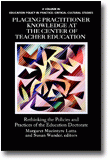
Placing Practitioner Knowledge at the Center of Teacher Education
Rethinking the Policies and Practices of the Education Doctorate
Edited by:
Margaret Macintyre Latta, University of Nebraska-Lincoln
Susan Wunder, University of Nebraska-Lincoln
A volume in the series: Education Policy in Practice: Critical Cultural Studies. Editor(s): Rodney Hopson, American University. Edmund Hamann, University of Nebraska-Lincoln.
Published 2012
Rethinking the Education Doctorate so that practitioner knowledge is at the center of programmatic concern in teacher education raises provocative education policy/practice considerations. Participants in the national Carnegie Project on the Education Doctorate (CPED) are doing just this. Their accounts of rethinking what counts as educational knowledge and their reconsideration of the roles of teacher educators, scholar-practitioners, students, policy makers, and others are illuminated in this book. Asserting the primacy of practitioner knowledge, the book generates a rich and complex terrain of issues and considerations that participating CPED institutions navigate as multiple technical, normative, and political questions at the crux of educator preparation, professional growth, and control of their field. And, it is this terrain that calls attention to the nature of practitioner knowledge and its inherent potential for redirecting, mediating, and generating education policy. Conversations within and across national and local levels orient away from technical means-ends “what works” questions alone, and open into normative and political questions about educational value and professional action.
In documenting the largest, most coordinated effort to rethink the educational doctorate in a century of such efforts, this book will interest teacher educators and programs engaged in pre-service and graduate level teacher education, practicing K-16 teachers, and education policy/practice interest groups and individuals. Illustrating a policy development method that is neither top-down nor necessarily ‘grass roots’, it also invites the interest of other educational sectors. Additionally, as CPED implementation contexts value interdisciplinarity, multiple methodological perspectives, and interactions and deliberations across interests, the lived consequences and significances of doing so are mapped out and, as such, hold much potential for policy/practice intersections within manifold education settings, and beyond, to settings of all kinds invested in the primacy of practitioner knowledge. Thus, a core goal of this volume is to broach these considerations with a broad readership.
CONTENTS
Series Editors’ Foreword, Edmund T. Hamann and Rodney Hopson. Acknowledgments. INTRODUCTION: TURNING TO PRACTITIONER KNOWLEDGE: POLICIES AND PRACTICES IN RELATION TO THE EdD. Investing in the Formative Nature of Professional Learning: Redirecting, Mediating, and Generating Education Practice-as-Policy, Margaret Macintyre Latta and Susan Wunder. Why We Need the EdD to Prepare New Faculty, Eric Watts and David Imig. What History Reveals about the Education Doctorate, Jill Alexa Perry. PART I: LOCATING PRACTITIONER KNOWLEDGE: POLICY/PRACTICE CONSIDERATIONS AT STAKE. Redesigning an EdD Program: Reality and Necessity Engender New Possibilities, Sharon Ryan, Richard De Lisi, and Kim Heuschkel. Learning to See Inquiry as a Resource for Practice, Ruth M. Heaton and Stephen A. Swidler. The Practices and Knowledge of School-Based Teacher Education Practitioners, Fran Arbaugh, Jim Nolan, Kelly Mark, and Rebecca Burns. The Scholarship of Practice: Intersections of Dialogue, Investigation, and Interactive Knowledge, Richard D. Sawyer and Michele R. Mason. PART II: CONFRONTING AND INTERROGATING PRACTITIONER KNOWLEDGE: POLICY/PRACTICE RISKS AND OPPORTUNITIES. Shared Inquiry: The Professional Development School as a Laboratory of Practice for Preparing the Next Generation of Teacher Educators, Bernard Badiali, Carla Zembal-Saul, Kristen Dewitt, and Donnan Stoicovy. Moving a Whole School Towards a Leadership-Oriented Doctorate: The Contributions and Limits of Vision and Participation, William Firestone and Alisa Belzer. From Teacher to Researcher, Researcher to Teacher: Examining Teachers’ Experiences of Conducting Research in Their Education Settings, Elaine Chan. Leadership for Educational Equity: Opportunities and Tensions of a New Doctorate of Education, Deanna Iceman Sands, Honorine Nocon, and Nancy Shanklin. The Promise of Preparing Teacher Leaders: Opportunities, Challenges, and Risks, Mary C. Markowitz and Marc Mahlios. PART III: INVESTING IN PRACTITIONER KNOWLEDGE: POLICY/PRACTICE RELATIONS AND POTENTIALS. No Longer “PhD-Lite”: Establishing a Professional Practice Doctorate of Substance, Thomas M. McGowan and Jon E. Pedersen. Intentional Teacher Education: The Education of Scholarly Practitioners, Jacqueline Edmondson and Iris Striedieck. Critical Friends: Curricular Redesign and Implementation of a Small Independent University’s Doctoral and Undergraduate Programs, Valerie A. Storey, Katrina M. Tellison, and Priscilla Boerger. Integrating Practice into an EdD Program in a Research Focused University, Sharon Ryan, Alisa Belzer, and Kim Heuschkel. Afterword, Susan Wunder and Margaret Macintyre Latta. About the Authors. Index.
REVIEWS
"Foregrounding practitioner expertise, as promoted by the book and the CPED consortium, would seem to be an urgent necessity in the shifting worlds of education policy, research, and practice. To do so in the course of doctoral study does not mean the EdD is inferior to the “pure research†model of the PhD in education. In fact, this text convincingly argues that practitioner knowledge is poised to transform PK-20 education more positively and profoundly than many current efforts at educational research and reform." Jenice L. View George Mason University in Teachers College Record (Read full review)
-
Paperback978-1-61735-737-4
Web price: $45.04 (Reg. 52.99)
-
Hardcover978-1-61735-738-1
Web price: $80.74 (Reg. 94.99)
- eBook978-1-61735-739-8

- EDU034000 - EDUCATION: EDUCATIONAL POLICY & REFORM: General
- EDU029000 - EDUCATION: TEACHING METHODS & MATERIALS: General
- EDU037000 - EDUCATION: Research
-
 Educated for Change?
Muslim Refugee Women in the West
Educated for Change?
Muslim Refugee Women in the West
-
 Learning to Hide
The English Learning Classroom as Sanctuary and Trap
Learning to Hide
The English Learning Classroom as Sanctuary and Trap
-
 Navigating the Volatility of Higher Education
Anthropological and Policy Perspectives
Navigating the Volatility of Higher Education
Anthropological and Policy Perspectives
-
 Paths to the Future of Higher Education
Paths to the Future of Higher Education
-
 Researching Race in Education
Policy, Practice and Qualitative Research
Researching Race in Education
Policy, Practice and Qualitative Research
-
 Revisiting Education in the New Latino Diaspora
Revisiting Education in the New Latino Diaspora
-
 The Construction, Negotiation, and Representation of Immigrant Student Identities in South African schools
The Construction, Negotiation, and Representation of Immigrant Student Identities in South African schools

